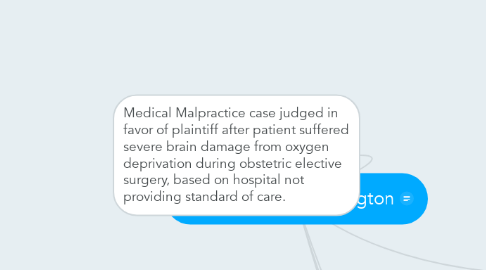
1. Medical Malpractice case judged in favor of plaintiff after patient suffered severe brain damage from oxygen deprivation during obstetric elective surgery, based on hospital not providing standard of care.
2. Hospital appealed.
2.1. FACTS
2.1.1. Nov 1987 - Mrs Thompson, healthy 36 y-o patient is scheduled to an abortion and tube ligation procedure under general anesthesia. Nurse-Anesthettisc inserted endotracheal tube in patient’s esophagus instead of patients trachea. Despite surgeons reporting of dark color of patient’s blood, mistake is not noticed and during surgery patient has a cardiac arrest. After CPR, normal body functions are stabilized but severe and irreversible brain injury results.
2.1.1.1. Lack of CO2 monitoring during surgery is a major contributing factor for unfavorable outcome and should be part of standard medical care
2.1.1.1.1. Jury trial concluded in favor of Mrs Thompson's family.
2.1.1.1.2. Hospital appeal
2.2. RULING
2.2.1. Malpractice implies duty, breach of duty in ways such as of not providing standard of care, causation and damage.
2.2.1.1. The definition of standard of care is based on scientific reliable and established practices adopted by healthcare institutions and supported by expert opinions. A geographical standard must be taken in consideration when defining the local standard of care and its applications to the law requirements.
2.3. APPLICATION
2.3.1. Causation and Damage
2.3.1.1. Washington Hospital Center (WHC) does not question the sequence of facts that lead to injury of Mrs. Thompson
2.3.1.1.1. Lack of adequate oxygen supply during surgery leads to arrithmya and cardiac arrest. Cardiac arrest leads to insufficient vital tissue flow of oxygen and ischemic damage to major organs, and in particular to the highly sensitive and demanding brain tissue.
2.3.2. Breach of Duty (Standard of care)
2.3.2.1. Has the Hospital by not providing CO2 monitor compromised standard of care?
2.3.2.1.1. Definition of standard of care in the medical field requires expertise knowledge and testimony and/or proper documentation and implementation by the institution providing the services. In the present case, plaintiff’s invited expert confirms that CO2 monitors have been widely available in a number of US major hospitals and had been understood as valuable adjunctive to surgery monitoring and proper care.
2.3.2.1.2. Months before the surgery, according to testimony of chief anesthesiologist, Washington Hospital Center had been requested to acquire but not implemented as part of routine surgical care.
2.3.2.2. Second point raised regarding reducing amount payed by WHC based on previous settlement between plaintiffs and physician/nurse
2.4. CONCLUSION
2.4.1. Jury understands that standard of care was compromised by the unavailability of CO2 monitors and therefore malpractice was confirmed. The appeal jury confirms the initial ruling and hospital is responsible for providing repair to patient’s family.
